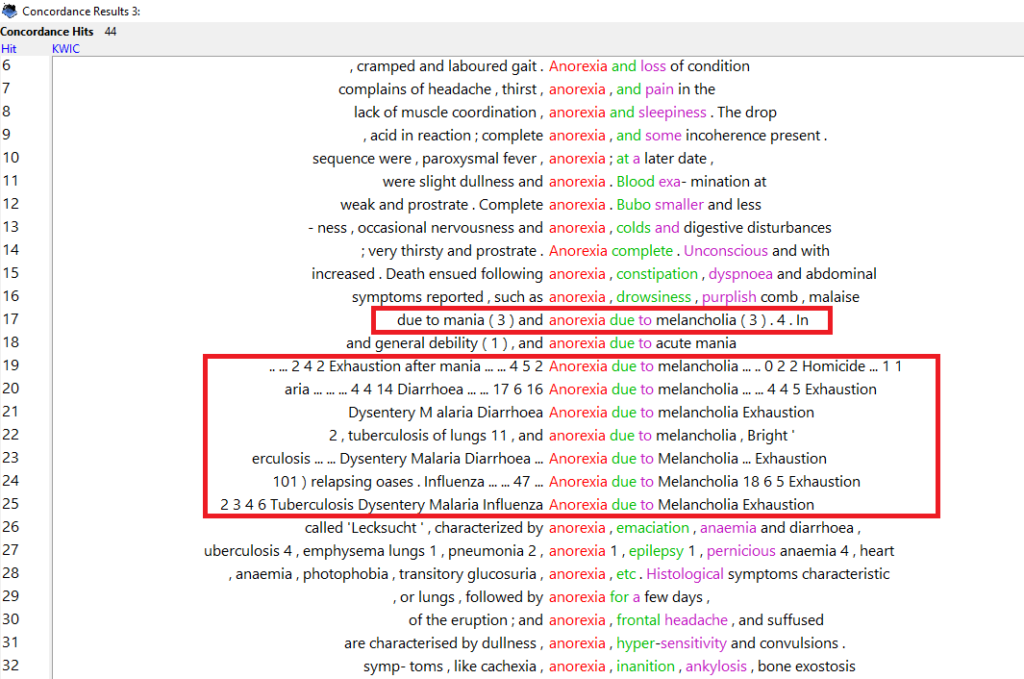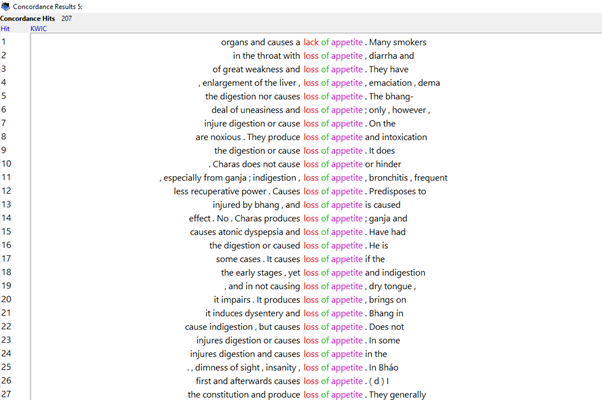by Jaclyn Kerr
I. Introduction
When deciding what topic to focus my analysis on for this project, I wanted to introduce some of the ideas I explored in some of my previous literature courses. One course I took covered representations of image and appetite in literature, and it was through this course that I developed an interest in how texts dealt with depictions of eating disorders. The data we’ve been allowed access to for this project is taken from the National Library of Scotland’s Medical History of British India, spanning records from around 1850 to 1920.
This collection is made up of ‘official publications varying from short reports to multi-volume histories related to disease, public health and medical research.’ With respect to mental health, it’s stated on their website that the medical history contains ‘[o]fficial asylum records’ which serve to ‘highlight the colonial context of psychiatry in British India and colonial ideas about the native body.’ Therefore, going into this analysis I decided that investigating whether the records contained any reference to eating disorders would be an interesting topic to look into further.
As a basis, an eating disorder is a mental health condition which covers any prolonged habit of abnormal eating. Currently, there are numerous classifications of eating disorders, such as anorexia nervosa, bulimia, and binge eating disorder to name a few, but given the scope of my analysis, I will primarily be focusing on anorexia. When I performed a search using the text analysis software AntConc, I received a total of 44 hits for anorexia.
II. Analysis
The fact that the search returned any results to me was surprising initially, as going into this, I wan’t expecting to find any mention due to the stigma associated with eating disorders that is still an issue today.
What I found interesting was that 17 of these hits were actually in reference to anorexia in animals; while the other 23 were referring to humans who were patients in mental health asylums or hospitals. These 23 results – covering a total of 9 files – were taken from official reports on mental health asylums in India, detailing patient symptoms and causes of death. After reading through the context of these results, I want to introduce an important distinction I found between the terms ‘anorexia’ and ‘anorexia nervosa.’
Nowadays, when people use the term anorexia, they are usually referring to anorexia nervosa. The Miller-Keane Encyclopedia and Dictionary of Medicine defines anorexia nervosa as ‘an eating disorder consisting of loss of appetite due to emotional states, such as anxiety, irritation, anger, and fear.’
It’s imporant to note then, that medically speaking, anorexia and anorexia nervosa are not interchangeable. The term anorexia by itself, is actually defined as the ‘lack or loss of appetite.’ So although it’s not used as this a frequently anymore, it makes sense for it to appear in reference to veterinary sciences as well.
Focusing on the results that pertain to humans, one aspect I found intriguing was the number of times anorexia was mentioned in reference to melancholia, which I’ve highlighted below:

Screenshot of AntConc search results for: anorexia
‘Melancholia’ is defined by the American Heritage Medical Dictionary as ‘[e]xtreme, persistent sadness or hopelessness; depression.’ Nowadays, the term is ‘[n]o longer in clinical use,’ and is now referred to as clinical depression, or major depressive disorder (MMD).
However, as I only received 23 hits for anorexia, I’m not able to draw any conclusions here, so I decided to perform another search for the definition of anorexia, which as stated before is the ‘lack or loss of appetite’:

Screenshot of AntConc search results for: lack of appetite and loss of appetite
As the screenshot shows, I received a lot more hits in reference to loss of, or lack of appetite – 207 in total. I noticed after briefly examining these results, that a large number were in reference to cannabis use, which if you’re interested in the connotations surrounding cannabis in the medical papers, you can find more about that here. However, what I did find in terms of mental health asylums, was that the official reports recognised a correlation between loss of appetite i.e., anorexia, and melancholia, i.e., MDD.

File view of AntConc search result 207 for: loss of appetite – found here
III. Summary
Text analysis tools such as AntConc, can aid scholars in every subject area in bringing forth new understandings to historical data. And looking back at what I found in the data, we can identify a trend that conforms to recent studies investigating correlations between eating disorders and other mental health conditions.
What I’ve discovered through researching this, is that although during the 19th to early 20th century, i.e., the period the collection encapsulates, anorexia nervosa was recognised as an eating disorder – notably British physician Sir William Gull coined the term ‘anorexia nervosa’ in 1873, but it was not as widely understood as it is today. The concept of eating disorders was even less understood in countries such as India, as historically, the country has had more stuggles with food shortages and famine.
Furthermore, recent studies have identified a link between anorexia nervosa and other mental health conditions, namely depression, anxiety, and obsessive-compulsive disorder (OCD). A paper published in 2021 noted a pattern in individuals suffering from another psychiatric conditon at the same time as anorexia nervosa, in particular noting that MDD was prevalent ‘in up to 64% of cases.’
Interestingly, a recent review has identified the prevalence of culture on representations of eating disorders. In Western conceptualisations, anorexia nervosa is primarily associated with dissatisfaction concerning body image, shape, or weight. However, in India, it’s been identified that representations of eating disorders show a ‘relative lack of concern for body fat/shape,’ – though it’s worth noting that there has been a recent shift, namely a growing association between perception of body shape in relation to eating disorders in India. Studies speculate that this trend could be due to ‘the ongoing rapid societal transitions in India and the increasing influence of western ideals.’
Photo by Ivan Bandura on Unsplash


